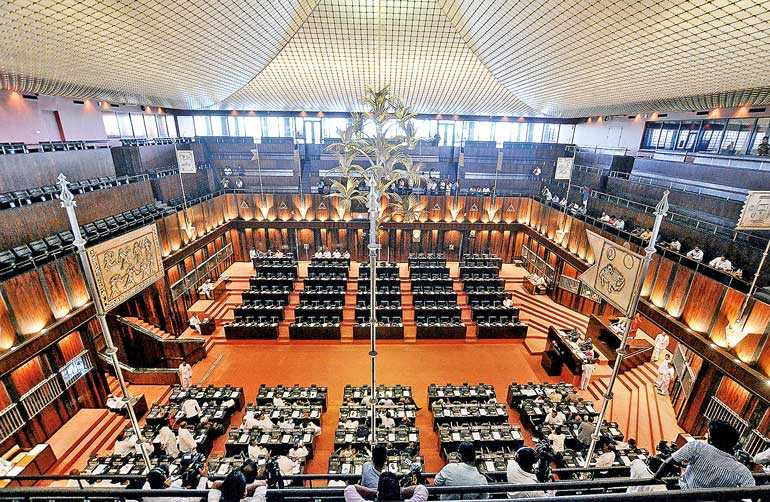Wednesday Feb 18, 2026
Wednesday Feb 18, 2026
Saturday, 1 December 2018 02:10 - - {{hitsCtrl.values.hits}}

By Ashwin Hemmathagama,
wOur Lobby Correspondent
The motion submitted to Parliament by the United National Party (UNP) to cut off funds to the Cabinet Ministers, Deputy Ministers and State Ministers appointed by President Maithripala Sirisena after 26 October received House approval yesterday with 122 lawmakers voting in favour.
In the absence of the UPFA lawmakers, who were boycotting Parliament, no votes were received against the motion.
UNP MP Patali Champika Ranawaka, who had signed the motion along with MPs Dr. Rajitha Senaratne, Ravi Karunanayake, Arjuna Ranatunga, Mano Ganesan, and Dr. Jayampathy Wickramaratne, moved the resolution in Parliament. The resolution held the Secretaries to any and all Ministries have no authority to approve any payment of monies drawn from the funds of the Republic for Ministers, State Ministers, Deputy Ministers and their personal staff.
According to the resolution, the UNP MPs held that the House on 16 November accepted the official statement made by the Speaker on 15 November that in terms of paragraph 2 of the no confidence motion against the Government adopted on 14 November, the Cabinet of Ministers stood dissolved in terms of Article 48 of the Constitution; and accordingly, the House further resolved that, since 26 October, as contemplated in Article 48 of the Constitution, the House had no confidence in the Government, including MP Mahinda Rajapaksa.
The MPs also held that Parliament has full control over public finance as mandated in Article 148 of the Constitution and the Parliament resolved that from 15 November, Secretaries to any and all Ministries have no authority to approve any payment of monies drawn from the funds of the Republic to pay for the salaries and other emoluments of Ministers, State Ministers, Deputy Ministers and their personal staff and are also prohibited from defraying expenses incurred in foreign travel, internal air travel including use of helicopters on behalf of the above Ministers and any person taking any action in violation of this resolution will be dealt with according to law.
The resolution was seconded by UNP MP Ranjith Madduma Bandara who held that there is no legitimate Government in the country with the UPFA having failed the no confidence motion.
“According to Article 76 of the Constitution, the law-making is entrusted upon the Parliament. The Articles 148 - 150 entrusted the Parliament with authority of the public finance. In the absence of a legitimate Government, Parliament will continue to control finances of the Republic. MP Mahinda Rajapaksa has no authority to control moneys of the State. We don’t have a Minister of Finance to issue the warrant necessary to make use of the consolidated funds,” said MP Ranawaka.
Drawing the House’s attention to the conduct of the Speaker, MP Ranawaka held that Mahinda Rajapaksa was accepted as the Prime Minster despite the protest of the UNP by placing full weight on the President’s Gazette notification. Moving on, the Speaker has provided MP Rajapaksa the Prime Minister’s seat in the Parliament, accepted UPFA MP Dinesh Gunawardena as the Leader of the House and S. B. Dissanayake as the Chief Government Whip.
“Speaker, you had an official standing on the Gazette notification. Even though we were against your decision to follow the Gazette, we didn’t go to the extent of pouring water on to your chair or resorting to chilli powder democracy in the Parliament. We behaved responsibly and civilised manner. But with the no confidence motion moved in Parliament on the 14 November, you have accepted that MP Rajapaksa is not the Prime Minister. So, no party can charge you for taking sides or favouring a particular political party,” said MP Ranawaka, expressing solidarity with Speaker Jayasuriya in the Parliament.
According to MP Ranawaka, the constitutional crisis has affected the economy badly and will continue throughout 2019, forcing the loss of investor confidence and causing businesses to make losses.
“The investments in government securities have withdrawn drastically. If it this trend continues, by the end of 2019, we will have Rs. 209 billion withdrawals from the government securities. If the tourism sector loses 20% its orders during this season, the value of such loss can be estimated at Rs. 150 billion. The IMF and other organisations withdrawing the protection provided to Sri Lanka has led to drastic increase in interest rates. We will have to earn an additional $ 5,600 million in 2019 to shoulder the debt servicing cycle. Not only will the impact of this issue spread over 10 years, where we will find Rs. 324 billion additional monies?” MP Ranawaka explained the dark side of the constitutional coup.
“If we lose the GSP plus in Europe, that will lead us to lose Rs. 76 billion in 2019. The sudden benefits MP Mahinda Rajapaksa offered during the last few days will cost us Rs. 150 million. So, all in all, next year the full loss will come to Rs. 617 billion. The constitutional coup stopped the Japanese loan obtained at 0.1% interest rate to build the light railway from Kaduwela to Colombo. It was to be repaid in 40 years. The Millennium Challenge Corporation of the US, which offered Sri Lanka $ 480 million worth of assistance to help measure the lands of the country, will not proceed,” he added.